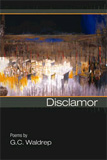 Review by Cameron Conaway
Review by Cameron Conaway
DISCLAMOR
by G.C. Waldrep
BOA Editions, LTD
250 N. Goodman Street, Suite 306
Rochester, NY 14607
ISBN: 978-1-929918-97-3
2007, 99 pp., $16.00
www.boaeditions.org
Prior to beginning this review, I placed my computer and Disclamor on the patio table to begin writing. My cell phone rang. I ran in the house to grab it. I came back to the patio table to find a bird had shit all over G.C.’s book. It was warm and when I wiped it, it smeared. This is not a sign as most things I view in nature to be. G.C.’s Disclamor in no way resembles in shape or texture the black and white Pollock-like shit deposited on the cover. This goes for meaning too. In no way is Disclamor ‘shit.’ But I’ve never had a book of poems shit on, so it seemed worth mentioning. On to the review.
Most of the explorations of this book in prior reviews concern “The Batteries,” a sequence of poems from and about the gun emplacements in what formerly had been Forts Barry and Cronkhite overlooking the Golden Gate Bridge. The series has won awards and seems to be the way this book is “pushed” but it was not where I felt Waldrep was at his best. At times throughout this book, word choice became overly “academic,” pulling away from the poem’s meaning. “Google” poetry doesn’t interest me a whole lot. I want to sit down, outside, without birds shitting on me, to read, enjoy, and engage with a book of poems. It became difficult for me to do because of an elevated diction that didn’t seem context-appropriate.
Conversely, when the diction fit the work, there were times where I was shook to my core with the beauty of Waldrep’s poetry. Associational leaps mix with meditative-declaratives to create a natural synergy that allows the speaker to be believable. From the poem “Cloud of Witnesses”:
and I think the phone will ring. It always has. It is not ashamed of this,
its function, like the hollyberries in their naked plenty
which bob and weave, the bees which,
seeking their gilded herm, their bone-skep pene-
trate and stop at one single point, as light in certain media.
I crave the aftersilence. Angry buzz as night falls:
that artificial sun, a carnegie of lovers. I had rather been weeping.
It is beautiful. It is almost fearfully beautiful.
It is most fearsomely beautiful. I am still thinking, I am still waiting
for the phone to ring. (9)
And in the poem “Every Apple, Every Dreamer, Every Prime”:
as if
we were going: somewhere, same place
electricity goes at night. The sound
it makes: I am always confusing
with blood: (the sound): that purling
hum. (16)
And the poem “Circle Park” opens with: “At the place in the trail where one is supposed/ to leave a stone, I take one. Selfish, I know,” (26).
Two other poems, in which I enjoyed so much I will most likely be sharing with my high school students, were “What Lived in Our Mouths” and “Feeding the Pear.” They are examples of poems in which the diction is appropriate and it is because of this that the reader can read, enjoy, absorb without any unnecessary distractions or pauses.
Excerpt from “What Lives in Our Mouths”:
At first there were small bats, dropping
like teeth at the onset of evening, warm and furry.
But their leathery wings tickled
our palates. Next
a clutch of scarab beetles,
which climbed down our flannel shirts
one by one in their stately and elegant way
in the mornings, and back
when the dew fell. After they left
a family of severed fingers took up residence
behind our tongues. (47)
Excerpt from “Feeding the Pear.”
At the singing someone handed me a pear and said
“Feed it.” There was a little mouth drawn on the flank
of the pear, but no nose, no eyes, no ears.
I had no idea what a pear would eat.
I tried carrot sticks. I tried a packet of sugar
from the fellowship hall. The pear remained obique,
its mouth drawn on, as with magic marker.
The music started up again
but my place on the bench had been taken
by someone else. Anyway I was preoccupied.
I didn’t want to bruise the pear. (64)
“The Batteries” mentioned before are presented once every three-to-five poems. There are nine total. Again, for other reviewers, it seems that the nine “Batteries” have been the focal point, but I have to disagree. I think the three-to-five poems in between are often more substantial, stronger, and more polished works. At many points, poets seem to use some type of tactic like this to break up what they perceive to be monotonous. But, G.C. Waldrep’s doesn’t seem to function that way; in fact, at times it even felt the opposite–that “The Batteries” were coming up next right when I was getting into a groove with Disclamor’s other work. The negatives of this book, for me, seemed to be the most highly acclaimed, so keeping that in mind, I could see a broad range of readers able to walk away after reading Disclamor with an equally broad interpretation of what was enjoyed.
Comments are closed.